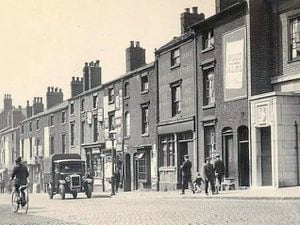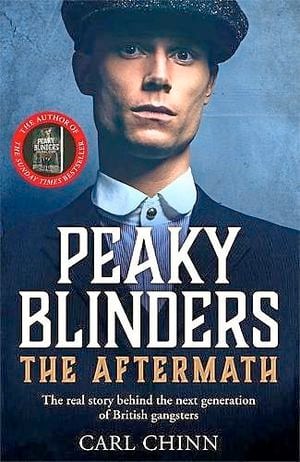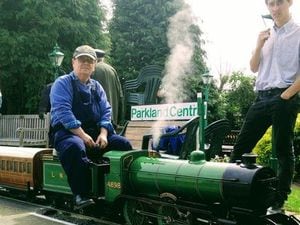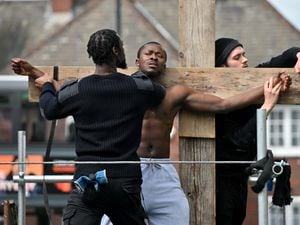Beyond the Peaky Blinders – Professor Carl Chinn's new book looks at the next stage in the history of Britain's gangsters
Since 2013, hit BBC drama Peaky Blinders has had audiences hooked on the world of early 20th century British gangsterism.

Presenting us with an expanding cohort of stylish anti-heroes, the award-winning series has always conveyed a certain shade of cut-throat glamour as permeating the world of its protagonists.
With the highly-anticipated sixth and final series due to hit our screens next year, and with a movie reportedly destined to follow, we can expect this to continue for a while yet.
One man however, is all too aware that Peaky Blinders, while a brilliant drama, is a drama nonetheless. The reality upon which it is based was far less romantic, noble and urbane. Yet, as the gentleman in question has proven through a store of published works, it is just as intriguing, gripping and compelling.
Professor Carl Chinn, MBE, has spent years exploring the true history behind the gangs that blighted Birmingham and the rest of Britain during the late 19th and early 20th centuries. The great grandson of a Peaky Blinder himself, across two books (Peaky Blinders: The Real Story, and Peaky Blinders: The Legacy) Carl revealed the true story of the rise of the notorious gang along with the bloody and violent tale that followed the evolution of the British criminal underworld through the 1920s.
Now, in his third and latest instalment in the series – Peaky Blinders: The Aftermath – Carl examines the next fascinating era in the landscape of Britain’s gangs, and a point at which things began to notably change.

“The first book was very much about the real Peaky Blinders of Birmingham, leading into the rise of the figure of Billy Kimber,” said Carl. “Unlike in the TV series, where he is portrayed as a small Londoner, Kimber was actually a big, burly Brummie! He had been a Peaky Blinder and eventually went on to lead England’s first major gang that operated on a national scale – the Birmingham Gang, which was itself largely made up of former Peaky Blinders.
“The second book looked at the rise of the Birmingham Gang, how they began to extort money from bookmakers down south, and their involvement in Britain’s first major gang war with the London-based Sabini gang. That book took things up to the point where the Birmingham Gang eventually withdrew back to the Midlands and to the north, and to the point where by 1924/25 things were beginning to change.”
Where Carl’s new book picks the tale up, the infamous criminals of 1920s Britain have retired from their life of violence, certain gang rivalries have been resolved and the Home Secretary of the day considers the war against the gangs all but won. However, in reality, the violence is far from over.

As Britain moves further toward the mid-20th century, change is afoot. Cities are beginning to shift from smog-filled industrial hubs to more efficient metropolitan centres of commerce and, despite the country once again being blighted by war, society is beginning to move towards a more modern, forward-thinking era. But change is not only limited to regular men and women. Under the shifting tides of development, the criminal underbelly is also evolving, anxious for new avenues of exploitation and expansion.
After the violent reign of the Peaky Blinders, the intimidation of the Birmingham Gang, and frequent gang wars up and down the country, new criminal groups emerge from the wreckage with fresh ways of making money and causing trouble.
Like those who came before them, they leave havoc and destruction in their wake.
Bringing this new generation of criminals into focus, Peaky Blinders: The Aftermath explores a murky world of gangsterism in the shadows, dog track extortion, and the rise and role of Soho nightclubs in the activities of the underworld.
“I take the story up to the fall of London East End hard man Jack Spot and the move away from gangsterism of his rival Billy Hill, and up to the rise of the Krays,” said Carl.
The book also tells the story of what happened to key dramatis personae to have featured in Carl’s previous works, including the Sabinis, and of course, Billy Kimber and the Birmingham Gang.
“I was very intrigued as to what happened to the Birmingham Gang,” Carl said. “They had begun in the late 1800s as a loose and rampaging collection of little mobs called the Brummagem Boys, and Kimber later brought them together in a more organised fashion.
“After the truce is declared with the Sabinis following the gang war, Kimber disappeared to America and then ended up as a legitimate bookmaker in Torquay. Once he’s gone, a leadership gap is left in the Birmingham Gang, and in my new book, the story moves forward from there.”
For Carl, Peaky Blinders: The Aftermath has been equally as much a labour of love as it has intellect, even featuring details of his own family’s history and its involvement in the Birmingham bookmaking world.
Passionate about telling the next part in the tale, Carl dedicated himself to research during the height of the pandemic. Revisiting interviews he had carried out over 30 years ago and meticulously pouring over newspaper clippings and archived reports, the noted academic worked tirelessly to fill in the details of this next stage in the story of the British underworld.
“I went back to some of the interviews I did in the late 80s, and a lot of material from newspapers has also been really important in putting this book together. To piece everything together I’ve had to use a mixture of photographs from the period and archived written material. There’s a lot more material available about the underworld of the 50s and 60s than that of the mid-20s to the late 40s, so at times the research was quite challenging.”
Despite this, Carl persevered, helped immensely via the resources of The National Archives in London. Luckily for Carl though, his principal visit there took place just in the nick of time.
“I focus on primary research and I was ever so fortunate in that I managed to get down to The National Archives just in between the lockdowns,” he said. “They were only doing the bookings once a week for a limited number of people. For three or four weeks I was desperately trying to book in, and when I finally got in, a week later the second lockdown came in. A mass of material from The National Archives went in to putting the book together, so it was very lucky that I went when I did!”
Lucky this may have been, but the skill with which this best-selling author puts together his latest volume is hard-earned. Once again Carl Chinn has delivered a fascinating insight into the history of British gangsterism and continues to hold his head high as one of the foremost authorities on the subject.
A captivating and compelling read, Peaky Blinders: The Aftermath could make a splendid stocking filler this Christmas, particularly if teamed with a dapper flat cap.
Peaky Blinders: The Aftermath by Carl Chinn (published by John Blake Publishing) is out now.
Carl will be giving an illustrated talk on the first book in the series, Peaky Blinders: The Real Story, at Nortons Digbeth in Meriden Street, Birmingham, on Thursday, November 18, at 8pm, followed by a book signing. Admission is free but needs to be booked at nortonsdigbeth.com




